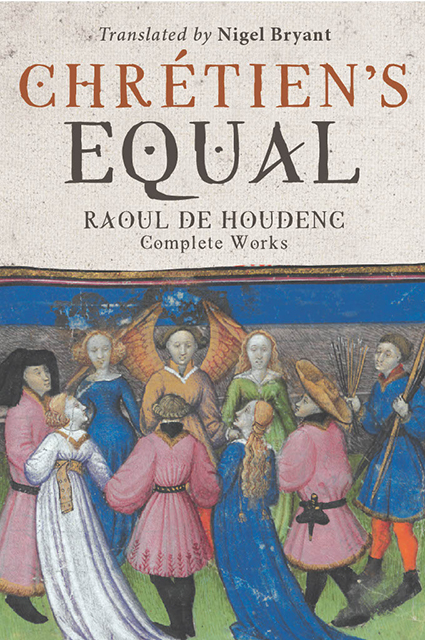Book contents
- Frontmatter
- Contents
- Introduction
- The Romance of the Wings (Le Roman des Eles)
- Meraugis of Portlesguez (Meraugis de Portlesguez)
- Sir Gawain and the Avenging of Raguidel (La Vengeance Raguidel)
- The Burgess’s Burgeoning Blight (Le Borjois Borjon or Li Dis Raoul Hosdaing)
- The Dream of Hell (Le Songe d’Enfer)
- The Path to Paradise (La Voie de Paradis)
- Index to Meraugis of Portlesguez
- Index to The Avenging of Raguidel
- Arthurian Studies
Introduction
Published online by Cambridge University Press: 14 January 2023
- Frontmatter
- Contents
- Introduction
- The Romance of the Wings (Le Roman des Eles)
- Meraugis of Portlesguez (Meraugis de Portlesguez)
- Sir Gawain and the Avenging of Raguidel (La Vengeance Raguidel)
- The Burgess’s Burgeoning Blight (Le Borjois Borjon or Li Dis Raoul Hosdaing)
- The Dream of Hell (Le Songe d’Enfer)
- The Path to Paradise (La Voie de Paradis)
- Index to Meraugis of Portlesguez
- Index to The Avenging of Raguidel
- Arthurian Studies
Summary
Roul de Houdenc, composing his work in the opening decades of the thirteenth century, was viewed by at least one contemporary as a poet of the highest order. In his Tournament of the Antichrist (c. 1235) Huon de Méry, quoting repeatedly from Raoul’s work, famously ranked him alongside Chrétien de Troyes, saying that ‘no mouth in Christendom ever uttered such fine words as they’. In the following decades references to Raoul’s romances make it clear, too, that the compilers of the Suite du Merlin and the Livre d’Artus deemed his work ‘worthy of memory on a par with the Prose Lancelot … [and] placed Raoul de Houdenc and Chrétien de Troyes on the same level in terms of authority’.
His surviving works are unusually varied. They are all in verse and in the same form (octosyllabic rhyming couplets), but their content could not be more diverse: they include an impassioned tract about the values of knighthood (The Romance of the Wings), two superbly crafted Arthurian romances (Meraugis of Portlesguez and The Avenging of Raguidel), a swingeing polemic against declining standards especially among the bourgeoisie (The Burgess’s Burgeoning Blight), and a prototype of Dante’s Divine Comedy in two allegories about journeys to Hell and Paradise.
His authorship of one of the romances, The Avenging of Raguidel, and of the second of the allegories, The Path to Paradise, has been much debated. In the case of Raguidel, as I shall discuss in due course, I think it overwhelmingly likely that the ‘Raoul’ who names himself as the author twice in the poem is Raoul de Houdenc; in the case of Paradise, however, it is most unlikely – bordering on impossible – that Raoul, although he may have been involved in its conception, was its composer.
But it might be said that the question of authorship matters little, as we know nothing for certain about him anyway. His social status is unclear: was he a cleric?; a wandering minstrel? A literal reading might suggest the latter when, in his dreamed visit to Hell, he tells Pilate and Beelzebub that ‘I’ve been in Saxony, Champagne, Burgundy, Lombardy and England.
- Type
- Chapter
- Information
- Chrétien's Equal: Raoul de HoudencComplete Works, pp. 1 - 36Publisher: Boydell & BrewerPrint publication year: 2021

